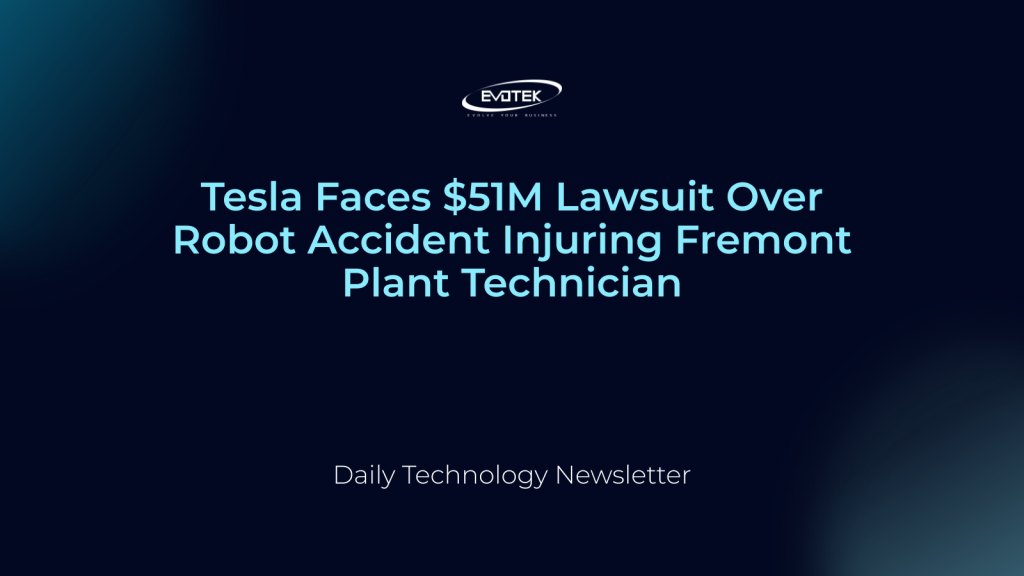A shocking incident at Tesla’s Fremont, California, manufacturing plant has led to a substantial $51 million lawsuit against the electric vehicle giant. Robotics technician Peter Hinterdobler, 50, alleges he was severely injured when an assembly-line robot unexpectedly struck him, rendering him unconscious and leaving him with immense medical debt. The lawsuit, targeting both Tesla and robotics firm FANUC, shines a spotlight on critical workplace safety concerns within advanced manufacturing environments.
According to court documents, the harrowing event occurred on July 22, 2023. Hinterdobler was assisting an engineer with the disassembly of a robot, which had been moved from its standard position on the Model 3 production line. During this process, the robot’s arm reportedly released with “great force” and “without warning,” driven by its own power and an approximately 8,000-pound counterbalance weight. The impact threw Hinterdobler to the floor, resulting in unconsciousness and significant injuries.
Demands for Extensive Damages
Hinterdobler’s claims for damages are extensive, reflecting the profound impact of his injuries. His medical expenses have already reached $1 million, with an additional $6 million anticipated. The personal injury lawsuit seeks $20 million for pain, suffering, and inconvenience, $10 million for emotional distress, $1 million for past lost earnings, and $8 million for diminished future earning capacity. Furthermore, he is claiming $5 million for the loss of past and future household services, bringing the total compensation sought to $51 million.
Allegations Against Tesla and FANUC
The lawsuit, initially filed in California state court before being moved to Oakland federal court on August 19, names both Tesla and FANUC as defendants. Hinterdobler’s legal team contends that Tesla failed in its duty of care, specifically in the robot’s ownership, operation, maintenance, supervision, and overall safety protocols. The complaint alleges the robot was positioned in an “area not designated for such equipment” and that Tesla neglected to ensure the device was “safely de-energized, secured, and stable” before the technician began his work. Adding to these claims, Hinterdobler’s complaint states that Tesla has since implemented new rigging and safety procedures related to the specific robot involved, and has also denied him access to crucial video footage of the incident despite multiple requests.
Against FANUC, the manufacturer of the industrial robot, allegations include negligent design and a failure to provide adequate instructions for safe operation. The complaint further asserts that the robot “failed in a dangerous and unexpected manner.” Neither Tesla nor FANUC has publicly responded to these allegations or filed formal answers to the complaint.
Broader Concerns About Industrial Robot Safety and Workplace Culture
This incident is not an isolated one in the rapidly evolving world of automation and factory production. The increasing integration of industrial robots has unfortunately been accompanied by a rise in workplace accidents. A 2024 study indicates a steady increase in robot-related injuries and fatalities since the first recorded death in 1979 at a Ford plant. Data from the Occupational Safety and Health Administration (OSHA) records document numerous severe incidents, from concussions to fatalities caused by robot interactions. For instance, in 2021, a Tesla engineer at the Austin Gigafactory was reportedly ‘attacked’ by a robot, sustaining injuries and falling into a scrap metal chute. FANUC, too, has faced prior legal action; in 2015, one of its robots was implicated in the death of a maintenance engineer in Michigan whose skull was crushed.
The Fremont plant, where Hinterdobler worked on lines producing models like the Model 3, Model Y, and Model S, has faced its own share of controversies beyond robot safety. The facility, which employs 22,000 people, has been the subject of multiple lawsuits and allegations concerning workplace culture. In 2023, the U.S. Equal Employment Opportunity Commission (EEOC) sued Tesla over alleged rampant racism. The company recently settled a lawsuit with a Black employee who reported discriminatory greetings like “Welcome to the plantation.” Furthermore, a recent lawsuit by the former head of security detailed alarming allegations of sexual assaults, widespread drug use, physical altercations, and pervasive bigotry, including frequent use of racial slurs, within the factory environment.
The lawsuit seeks general, punitive, and exemplary damages, along with specific compensation for lost earnings, medical expenses, and diminished earning capacity, all to be determined by a jury. This high-stakes legal battle underscores the critical importance of robust safety protocols and accountability as industrial automation continues to expand across manufacturing sectors.

 日本語
日本語 한국어
한국어 Tiếng Việt
Tiếng Việt 简体中文
简体中文